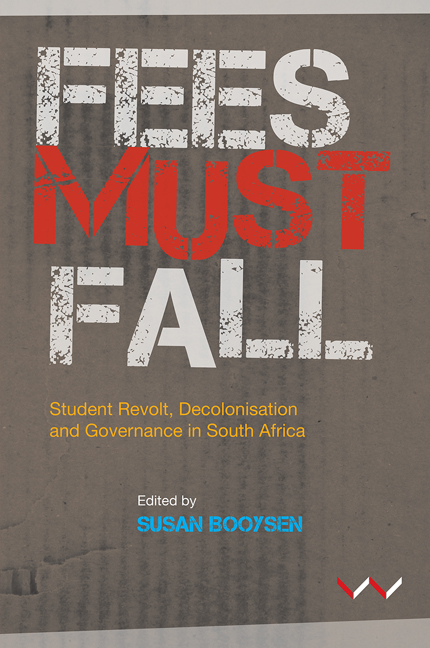Book contents
- Frontmatter
- Contents
- Acknowledgements
- Preface
- Introduction
- PART ONE POWER REDEFINED – ‘WHAT HAPPENED TO GOVERNANCE?’
- PART TWO PRIMARY VOICES – ‘THE ROOTS OF THE REVOLUTION’
- PART THREE THE REVOLT – ‘RISING AGAINST THE LIBERATORS’, SOUTH AFRICA IN AFRICA
- Chapter 6 Standing on the shoulders of giants? Successive generations of youth sacrifice in South Africa
- Chapter 7 Learning from student protests in sub-Saharan Africa
- Chapter 8 Unfinished revolutions: The North African uprisings and notes on South Africa
- PART FOUR POWER AND CLASS REDEFINED – ‘SIT DOWN AND LISTEN TO US’
- PART FIVE JUSTICE, IDENTITY, FORCE AND RIGHTS – ‘WE CAME FOR THE REFUND’
- APPENDICES
- Contributors
- Index
Chapter 6 - Standing on the shoulders of giants? Successive generations of youth sacrifice in South Africa
from PART THREE - THE REVOLT – ‘RISING AGAINST THE LIBERATORS’, SOUTH AFRICA IN AFRICA
Published online by Cambridge University Press: 20 April 2018
- Frontmatter
- Contents
- Acknowledgements
- Preface
- Introduction
- PART ONE POWER REDEFINED – ‘WHAT HAPPENED TO GOVERNANCE?’
- PART TWO PRIMARY VOICES – ‘THE ROOTS OF THE REVOLUTION’
- PART THREE THE REVOLT – ‘RISING AGAINST THE LIBERATORS’, SOUTH AFRICA IN AFRICA
- Chapter 6 Standing on the shoulders of giants? Successive generations of youth sacrifice in South Africa
- Chapter 7 Learning from student protests in sub-Saharan Africa
- Chapter 8 Unfinished revolutions: The North African uprisings and notes on South Africa
- PART FOUR POWER AND CLASS REDEFINED – ‘SIT DOWN AND LISTEN TO US’
- PART FIVE JUSTICE, IDENTITY, FORCE AND RIGHTS – ‘WE CAME FOR THE REFUND’
- APPENDICES
- Contributors
- Index
Summary
INTRODUCTION
The struggle to overthrow apartheid was generated and populated by youth. From the transformative power of the African National Congress Youth League in the 1940s to the 1976 Soweto uprising through successive waves of youthand scholar/student-driven school boycotts, consumer boycotts and into the low intensity war that accompanied the 1990–1994 interregnum, young people placed their futures on hold and their lives on the line, to bring down apartheid. But what have these generational cohorts – many now well into late adulthood – received in return? And what lessons, if any, should the current wave of student protesters learn from this history?
This chapter uses a large sample survey (n = 27 485) of people of all races living in Gauteng, the economic and demographic heartland of South Africa, to identify successive (and current) cohorts of youth, so as to understand their situation after twenty-one years of democracy. It starts with the ‘1976 generation’, and includes those who were involved in the successive uprisings of the 1980s, the youth of the 1990–1994 interregnum, and the so-called ‘born frees’. The chapter looks at their demographic situation, and lingers on some psychosocial variables such as racial views, alienation, anomie, xenophobia and so on; and it seeks to understand whether this generational struggle will achieve more lasting gains than those which preceded it.
YOUTH STRUGGLES
Young people – youth, ‘young lions’, ‘lost generation’, ‘marginalised youth’, ‘born frees’, students, Gen X or Y, millennials or whatever labels are appended – have consistently led progressive movements for change, whether in the struggle for democracy in South Africa, the different struggles that made up the ‘Arab Spring’, the Occupy movement, and so on (Rizvi 2012; Everatt 2013; Wyn and Cahill 2015). Successive surveys in South Africa and elsewhere have shown that young people support democratic values and principles in larger proportions and with greater fervour than their adult counterparts in the same surveys (Everatt 2013; Wallace and Kovatcheva 1998; Helve and Holm 2005). But youth are not an undifferentiated mass; ‘youth’ is a label that covers people in a specific age cohort, and while some characteristics are common (psychosocial and emotional development, experimental and risk-taking behaviours, for example), ‘youth’ as a cohort are as complex, nuanced and differentiated as any other age group in society.
- Type
- Chapter
- Information
- Fees Must FallStudent revolt, decolonisation and governance in South Africa, pp. 126 - 147Publisher: Wits University PressPrint publication year: 2016



